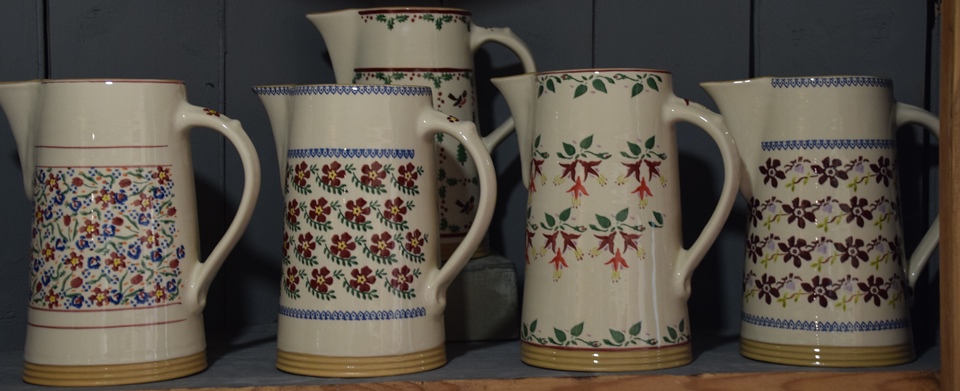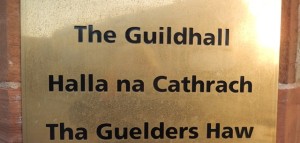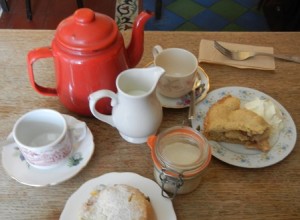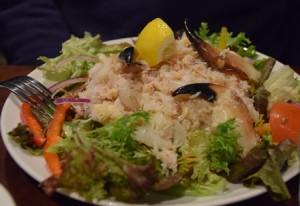17 Divided by a Common Language
Posted by Christine on Oct 20, 2014 in Ireland | 8 comments
When Michael O’Brien was guiding Agnes Scott students around Ireland, we would occasionally come upon an English word that one of us didn’t understand, or that had multiple meanings depending on context, or that was simply unfamiliar, or that didn’t exist in American English or in Irish English. Michael would give a look of mock despair and exclaim, “Divided by a common language!”
While Irish English is perfectly understandable most of the time in both vocabulary and accent, such moments do arise. One of the most appealing characteristics of English is its regional variations that define not only parts of the world and countries, but regions within countries, states, and even cities. For a long time I’ve collected interesting and fun examples of Irish English, and now that I’m here for an extended stay, my list is growing rapidly. From time to time, I’ll show off my collection here. Warning! If you are easily offended, read no further.
There is one word that I’ve learned not to use here in Ireland: pitcher. Yes, the word meaning that thing you use to pour milk into coffee or water into glasses. The more common word here is jug, and when I say “pitcher,” I always get confused looks. People hear “picture,” it seems. When questioned, they know what a pitcher is, but the word is archaic to them: “Something from ancient Greece in a museum,” someone explained to me. I’ve now trained myself to say “jug”: “Can we have a jug of water for the table, please?”
“Feck off!” “What’s your feckin’ problem?” “For feck’s sake!” Don’t be offended. I haven’t sunk to a new vulgar low. Feck is a very common word here in Ireland. You hear it every day, and you hear it on television. In most (but not all) cases it is considered a family friendly version of “the f-word,” to use that most euphemistic of all euphemisms. There are debates about its origin, but one argument suggests that it comes from the Irish word feic, which means “see.” I have to tell you that there are loads of words in Irish that sound a lot like the f-word when pronounced emphatically, including the word for word itself, focal, pronounced to rhyme with buckle. What this means about Ireland, I don’t pretend to know. The culture surrounding feck and the f-word is just very different here—the words are used more often and more casually than in American culture. Watch any modern Irish made film for further examples, but see especially The Commitments (directed by Alan Parker 1991 from the novel by Roddy Doyle). For a great discussion of the word, see “Sentence First: An Irishman’s blog about the English language.” For a definitive display of how the word feck is used in context, see any episode of Father Ted featuring Father Jack Hackett, but especially the famous “Feck off cup!” scene.
The other day I was stumped by a word while having coffee with the ladies from my local gym’s exercise class. Quite a few of them are committed play goers, and we got to talking about a fabulous play I had also seen called Ballyturk by Enda Walsh (starring Stephen Rea and Cillian Murphy—Yes! Both of them live on stage!). We all loved it, but one of the ladies said “You know it was slated in London.” After some thought, I realized that slated must be the equivalent of “panned,” and sure enough, when I looked it up I found it is British English for “criticize severely.”
A very common phrase here is “Fair play to him”; you say it when you want to acknowledge that someone you would normally criticize or dismiss did at least one thing right. For example, you might say “Napoleon may have been a dictator, but fair play to him, he set up a modern system of education in France.” Or “Nicholas Sparks is rather a hack, but fair play to him, he has written a lot of books that have been made into movies.” In other words, he’s “laughing all the way to the bank”; I’m not sure if that expression works here, but it’s obvious enough to cross cultures.
The Irish language does not have a word for yes or no. To answer a question, you use the verb and subject in the positive or negative. Here are a few examples.
- Ar mhaith leat uachtar ar on gcíste? (Do you want cream on the cake?) Ba mhaith! (I would!)
- An bhfuil aon rud eile uait? (Do you want anything else?) Tá aon rud eile uaim. (I want something else.)
- An mbeidh deoch agat? (Will you have a drink?) Ní bheidh. (I will not.)
This pattern influences the way the Irish speak English. And both Ron and I have picked it up without trying.
- Is she going swimming today? She is. She is not.
- Will you have a cup of tea? I will. I will not, but thank you.
- Can you give me some help? I can.
- Do you think I’ll do this same thing when I’m back in the USA? I do!
Whether sitting at a restaurant table or walking up to a shop counter to buy a newspaper, you are likely to be asked “Are you all right?” or “Are ye all right, there?” Either way, this means “Can I help you?” But I sometimes forget and answer “Oh I’m fine, and you?” eliciting a puzzled expression from the waitress or clerk.
Sometimes the different uses of words have political implications that may cause someone to take umbrage (just had to use that word). People here in the Republic do not like you to call this island part of “the British Isles,” even though the term is used in many atlases and maps to mean all the islands in this corner of Europe. I have taken to saying “this island” or “these islands” when talking to people from the Republic of Ireland or from Northern Ireland, though as an American I am usually forgiven for my blunders.
You may know that an agony aunt is the word for an advice columnist (like Dear Abby or Ann Landers) in both Britain and Ireland, but do you know what an Aunt Sally is? The term comes from a game played in Britain where players throw sticks or balls at a dummy called Aunt Sally, and so the term means “easy target.” “Fox News makes itself an Aunt Sally for Jon Stewart and The Colbert Report.”
Bollocks is also British slang that crept into Irish English and is used often and with relish. I love this word! But I don’t get it well enough to use it myself—yet. “Bollocks to that!” “What a load of bollocks!” “That’s just bollocks.” “He’s talking bollocks!” The word comes from an Anglo-Saxon word meaning “testicle” and has come to mean “useless,” “poor quality,” “nonsense,” or “pointless.” In the inversion so common to English and so wonderful to observe (think “bad ass”), when used with “the” or with “the dog’s,” bollocks can also mean something very good, top notch. “That performance was the bollocks!” “Your cooking is the dog’s bollocks!”




I LOVE this! You could write a book on this subject alone. Great title too!
The pitfalls of the vernacular! Love hearing about them.
So you won’t take umbrage (I too adore that word and any opportunity to use it), I love your jugs, Christine… 😉
Christine: Ron pointed me to your blog– which is marvelous!!
However, I have to post that any dish that’s referred to as “the dogs bollocks” sounds very unappetizing to say the least– given the origin of the word…..
Thanks, Bill! I’m sure that when you visit and have a pint or two of the black stuff your mind will shift to appreciating Ron’s cooking as “the dog’s bollocks”!
Sounds like the bollocks to me!
This made me think of this: https://www.youtube.com/watch?v=QCrg78KEWzI
Christine.. Am enjoying your blog. As mentioned today at Book Club the expression “janey mac” was one I heard frequently in Ireland during the 60’s and the 70’s. It was used to express surprise. Today I hear my irish cousins add the word “so” to say yes… E.g. Will you have another cup of tea? I will so.
I grew up with Irish born parents… Both from rural Ireland… so many of their expressions I am sure are no longer in usage. E.g. If we were leaving the house looking unkempt or untidy, my mother would tell us that we looked like a ” Streel”. She only used the expression on her daughters.
Enjoy the rest of your sabbatical. Thanks for a great meeting today. BETTY